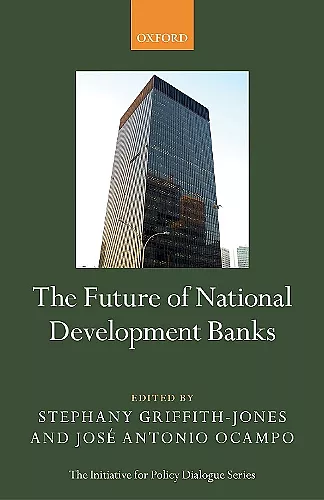The Future of National Development Banks
Stephany Griffith-Jones editor José Antonio Ocampo editor
Format:Hardback
Publisher:Oxford University Press
Published:30th Oct '18
Currently unavailable, and unfortunately no date known when it will be back

For a long time the topic of national development banks was limited to a debate between admirers and detractors of these institutions, often inserted into a more general debate of state versus markets. Since the 2007/8 North Atlantic financial crisis however, interest and support for these institutions has broadly increased in both developing and developed countries. Key issues such as understanding how development banks work, what their main aims are, and what their links with the private financial and corporate sector are have come to the forefront, and there is an increased interest in what instruments, incentives, and governance work better in general and in particular contexts. The Future of National Development Banks provides an in-depth study of several key examples of these institutions based in Brazil, Chile, China, Colombia, Germany, Mexico, and Peru. It explores horizontal issues such as their role in innovation and structural change, sustainable infrastructure financing, financial inclusion, and regulatory rules. It provides both research and policy-oriented perspectives on how these banks can make a significant contribution to a countries' development, and analyses their roles within broader economic policy, their governance, and the main instruments they use to perform their function. The Future of National Development Banks has important policy implications for countries that have these institutions and can improve them, and countries that do not have them yet and can learn from best practice.
Once considered a key vehicle for national advancement, development banks have come to be regarded as relics of a bygone age. This volume, however, reveals that these banks have in fact played highly positive roles in many countries. Moreover, it shows their best days may be ahead of them, as the need for large-scale, long-term finance grows with the challenges of climate change and techno-paradigm shift. Weaving together focused thematic analyses and rich, well-contextualized case studies, this excellent book presents a rigorous, balanced, and pragmatic discussion of one of the most important tools of economic development. Highly recommended. * Ha-Joon Chang, Reader in the Political Economy of Development, University of Cambridge, UK, and author of Kicking Away the Ladder and 23 Things They Don't Tell You About Capitalism *
This book is an excellent historical analysis of the positive role of national development banks worldwide. A clear incentive for these institutions to expand their products and services in line with the challenges of this new era, it is essential reading for researchers as well as national and international policy-makers dealing with economic development, and especially with development finance. * L. Enrique GarcÃa, Former President of the Development Bank of Latin America (CAF) *
This book is an outstanding and pioneering contribution to knowledge on national development banksâ valuable roles to help achieve countriesâ economic, social and environmental aims. The in-depth analysis of their activities, especially in major Latin American countries, shows their positive support for private and public investment, and for the development of the financial sector. This book clarifies, thanks to its comprehensive analysis, the positive impact of these development banks, which are increasingly important but not sufficiently known and valued. This book is a must read for all concerned with the role of the financial sector in development. * Enrique Iglesias, Former President of the Inter-American Development Bank *
The reputation of national development banks (NDBs) has waxed and waned as policy fashions have evolved over the years. The case studies included in this book demonstrate that NDBs continue to have an important function. They offer valuable lessons on how to enhance the contributions of NDBs to development and the conditions that are most conducive to their success. * Dani Rodrik, Ford Foundation Professor of International Political Economy at the John F. Kennedy School of Government, Harvard University *
ISBN: 9780198827948
Dimensions: 243mm x 163mm x 28mm
Weight: 752g
388 pages